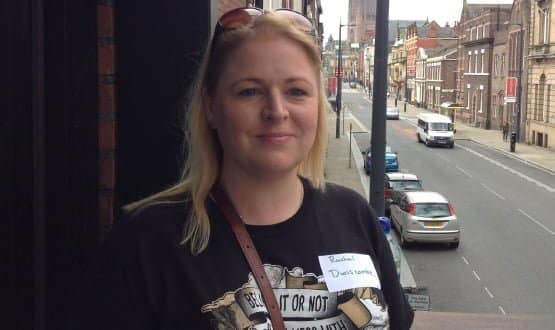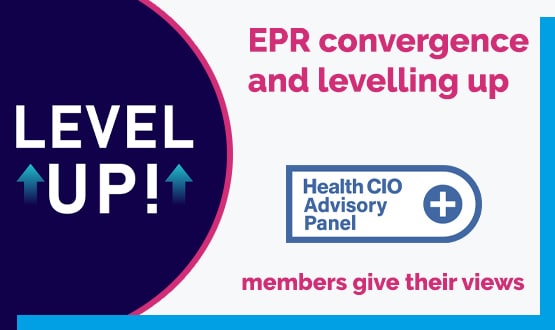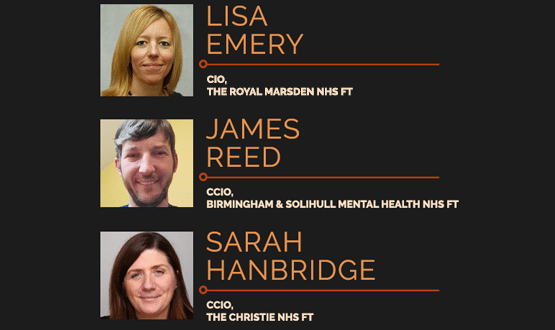Health CIO profile: Rachel Dunscombe
- 22 October 2014

Rachel Dunscombe believes her passion for innovation and exploring ways of doing things differently is down to working for a variety of small, but forward-thinking technical companies early in her career.
“The nineties were exciting times for the computer industry,” she says. “I was fortunate to work for firms who were often first to market with internet technologies. I also gained a lot of experience as a consultant on various ground-breaking Linux projects and Open Source development work in the military and financial sectors.”
Dunscombe also spent six years with insurance giant Swiss Life, where she managed online and partner-facing technologies – winning several European awards for innovation in areas such as website development and customer quotation systems in the process.
IT’s in her genes
Yet Dunscombe’s talents were by no means limited to the field of science and technology. Whilst studying biochemistry and computing at the University of Manchester Institute of Science and Technology (UMIST), she was also a part-time music teacher. “I love music and teaching it paid my way through university,” she says.
“Being surrounded by world-class musicians at that time, however, I couldn’t see myself competing with them. I realised early on that I was never going to be the best and that it was perhaps not the right long-term path for me. Music therefore became something I enjoy, as opposed to a career.”
Besides which, Dunscombe says she was encouraged to take an interest in computers from an early age. “My mum had a degree in computing and worked as a database administrator; while my father looked after the IT for the school where he taught.
“I found myself following in their footsteps when, as a senior prefect at school, I was put in charge of the computer room. I was also lucky to be surrounded by family and friends with IT careers, so I never had any fear about entering the IT world – I guess it was in my genes,” she says.
Nor do the family connections with IT end there. Dunscombe’s husband currently looks after iOS development at Barclays. “He’s had lots of weird and wonderful roles in military IT and we’ve even set up a couple of small ventures in mobile technology together, just as experiments really,” she adds.
Double-edged sword
Since entering the health service with NHS Cheshire and Mersey in February 2005, Dunscombe has been heavily involved in improving service management delivery.
This led to her become an examiner and advisor for the UK and European Information Technology Library (ITIL) and Prince2 qualifications. [ITIL relates to the management of IT services; and Prince2 (PRojects IN Controlled Environments) is a project management methodology].
At the suggestion that she must therefore be an ITIL ‘fan’, Dunscombe is cautious however. “That’s an interesting one,” she responds. “Am I a fan or am I one of those people in the ITIL world who simply wants to learn the rules and try to move informatics forward? ITIL is a set of rules, but it’s the human processes, leadership and culture around it which makes it work or not.
“Good practice methodologies like Prince2 and ITIL are a double-edged sword; they are brilliant, but they are not going to solve your problems alone. The processes are simply the tools and the framework around which you build things. It’s the culture, the humans and the leadership you wrap around the processes that will solve your problems.”
Improving IT maturity
Dunscombe readily admits, however, to being a fan of Agile Project Management, a methodology which, she claims, offers significant advantages over more accepted ways of project managing IT tasks. Having originated in the private sector, she says it has delivered outstanding results within her organisation.
As to whether she believes the NHS should therefore be generally more open to private sector influences and technologies, Dunscombe says she’s all for anything that will help to improve the maturity of IT within the organisation.
“For all the good that it did do, I believe the National Programme for IT stunted the maturity of our digital agenda by as much as ten years,” she says.
“I think we need to use a variety of approaches and toolsets; on the one hand, the NHS England Open Source Programme – and on the other, collaboration with private sector partners who bring new ways of working to the table. In short, I’m up for whatever solutions can take us to a level of maturity quickly and safely.
“I believe we need to be more commercially savvy, more open to new ways of working and new private sector professionals entering the NHS to help deliver more effective IT. For instance, if APM works in the private sector, I believe it can also work in the public sector.”
Having worked extensively on both sides of the fence, however, Dunscombe says she gets much more satisfaction from working in the public sector.
“I don’t think you’d get a more challenging or stimulating job in the private sector. It’s the satisfaction gained from knowing that you’re doing something to better people’s outcomes. For instance, as part of the chain that created a radiology system enabling same day oncology reporting within our strategic health authority, I was immensely gratified when it eventually benefited a close family member.
Re-authorisation challenge
Dunscombe joined Bolton NHS Foundation Trust in February 2013 knowing that the independent regulator Monitor had already found the Trust in breach of two of the terms of its authorisation, namely: failure to meet healthcare targets [specifically A&E waiting times and the Referral to Treatment (RTT) 18 week target] and failings in board governance.
“I immediately recognised that we faced huge challenges,” she says. “The most important thing for me was therefore to build a team of clinicians to act as advocates on behalf of the trust in terms of informatics. I’ve now got a small group – comprising two consultants, a charge nurse and the head of therapies – which I’m building as ‘the intelligent customer’ on behalf of all our clinicians.
“By working closely with the other directors and the executive team in this way, we’ve now made significant progress towards re-authorisation and we’ve succeeded in delivering our financial turnaround objective.”
Rewarding work
Outside work, Dunscombe is a curator for the Merseyside branch of Technology, Entertainment and Design (TED), a non-profit organisation devoted to spreading great ideas and sparking conversation – usually in the form of short talks on topics ranging from science to business and global issues. Added to which, she’s even found time to part of a world record-breaking formation skiing team!
At the end of the day, though, Dunscombe says it’s her work as a health CIO which she finds the most rewarding. “I’m immensely proud of the fact that the NHS was recently rated by the Commonwealth Fund (which is respected worldwide for its analysis of different health systems) as being superior to countries which spend far more on health.
“NHS staff work incredibly hard to care for patients and it’s that kind of recognition which motivates employees like myself and spurs us on,” she says. “As a system, we’re delivering the best value healthcare in the world and I believe that’s a gift we can build on,” she concludes.
| Fact box | |
| Name: | Rachel Dunscombe |
| Job title: | CIO, Bolton NHS Foundation Trust |
| Time in current role: | 1 year and 8 months |
| Key project: | Foundation infrastructure in terms of virtualisation and storage – as part of the planned step change from ten year-old technology to a state-of-the-art, virtualised desktop – once the trust achieves re-authorisation. |
| Favourite technology: | Skiline (www.skiline.cc), an iOS app which enables skiers to track and analyse their performance on the slopes. |
| Best thing about job: | “The engagement with clinicians. Bolton is unique in its outlook and has the best clinical team I’ve ever had the pleasure to work with.” |
| Worst thing about job: | “In our current environment, the frustration sometimes at not being able to deliver what clinicians need as quickly as they would like in order to improve the quality of care.” |




